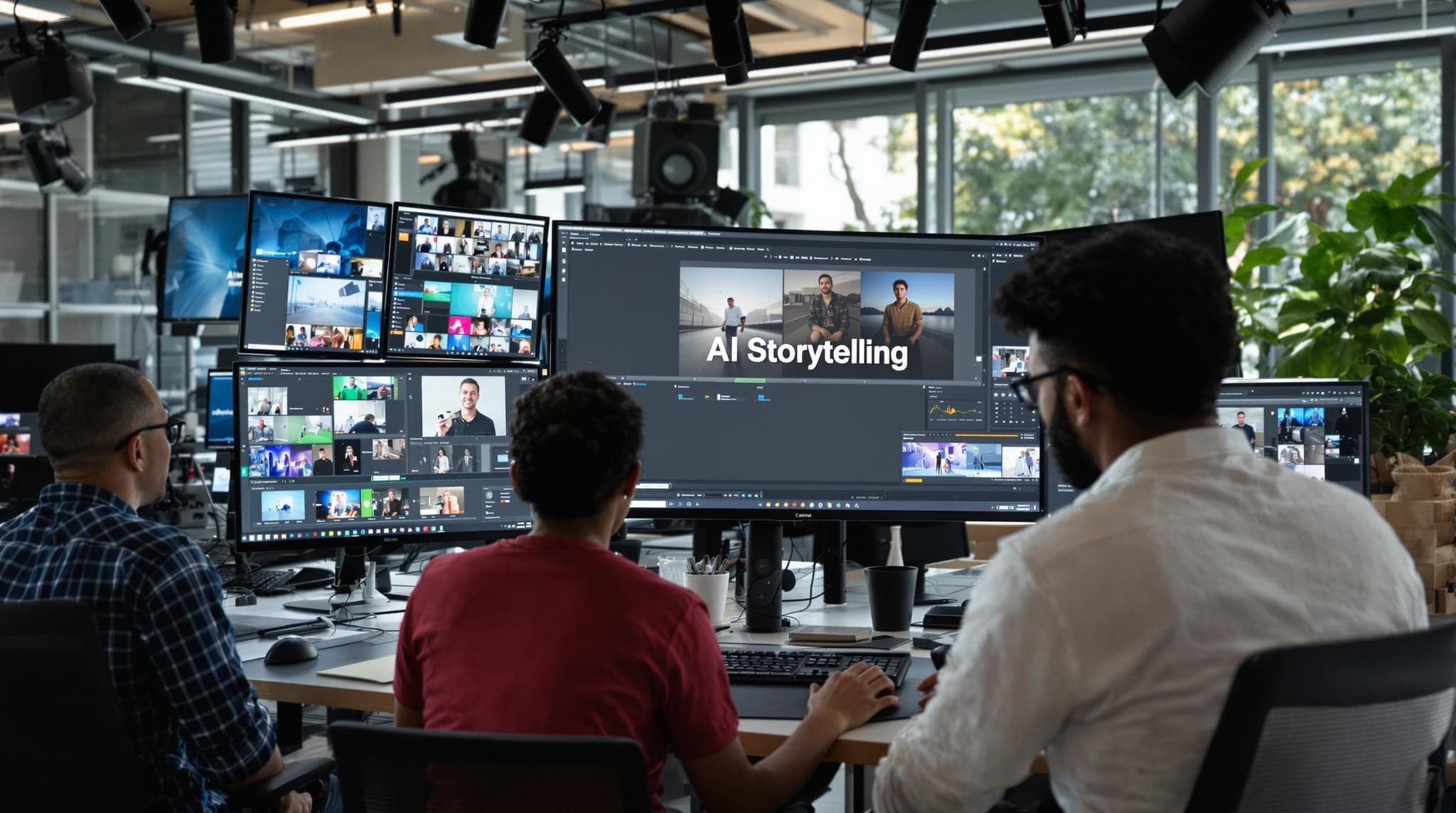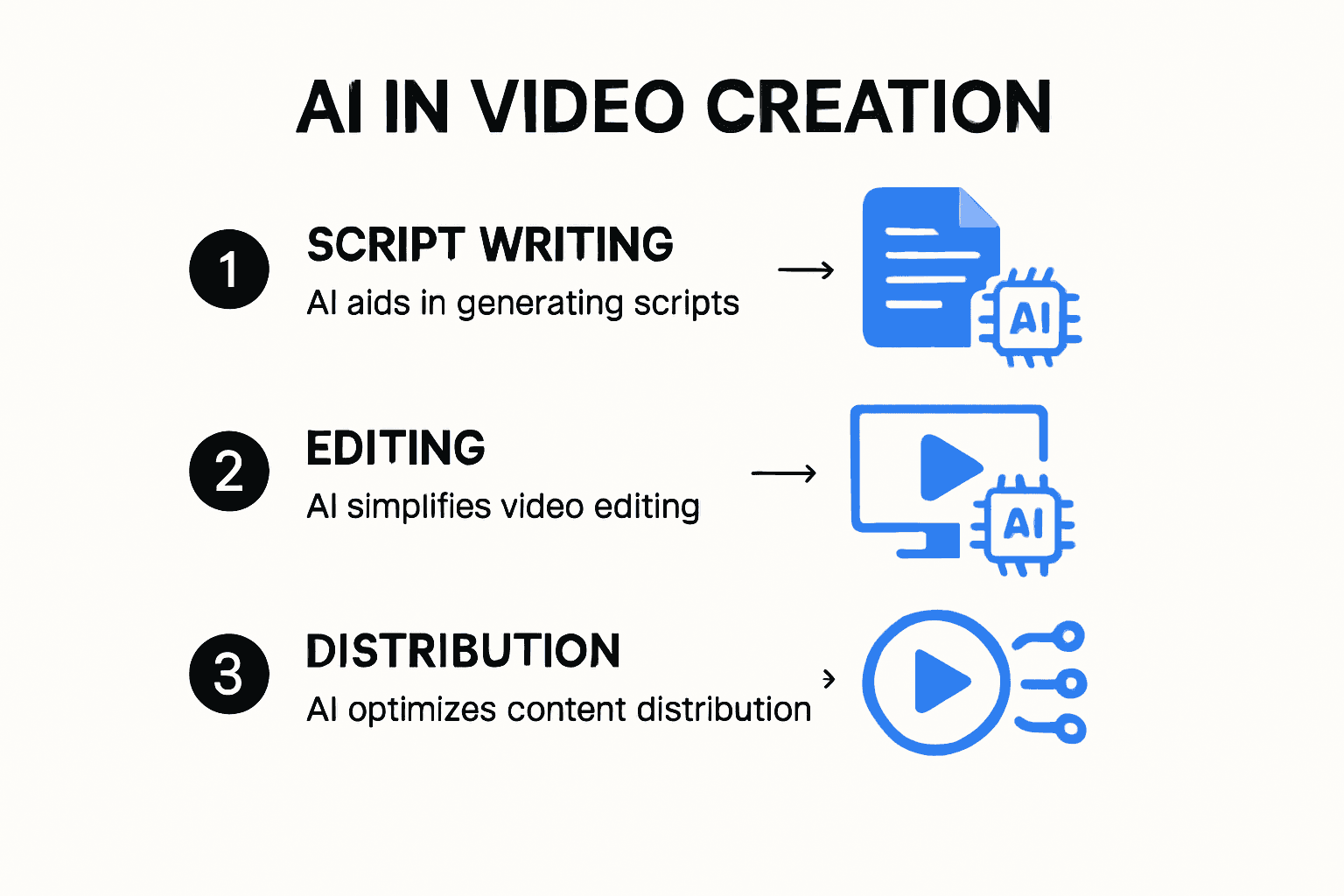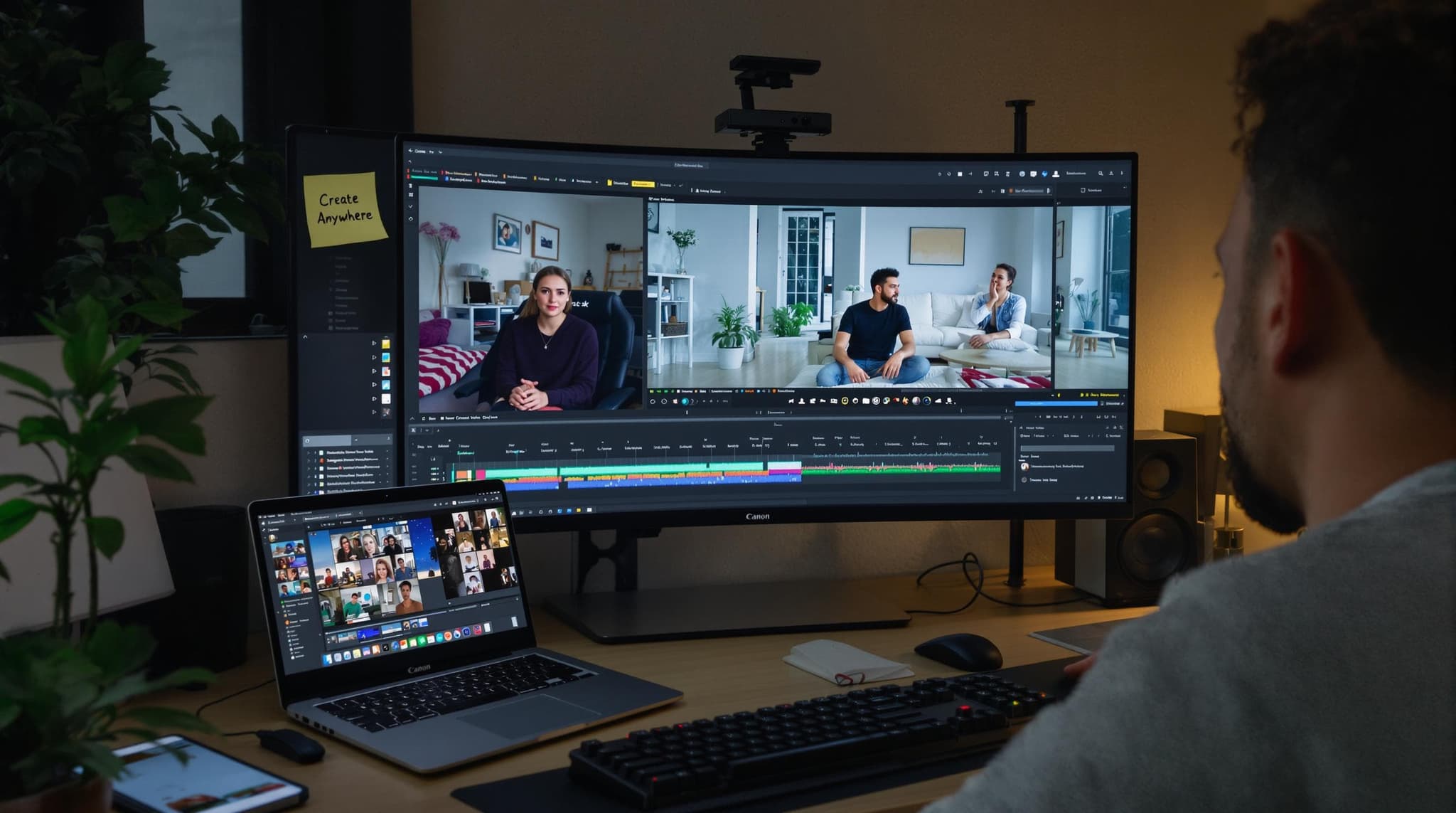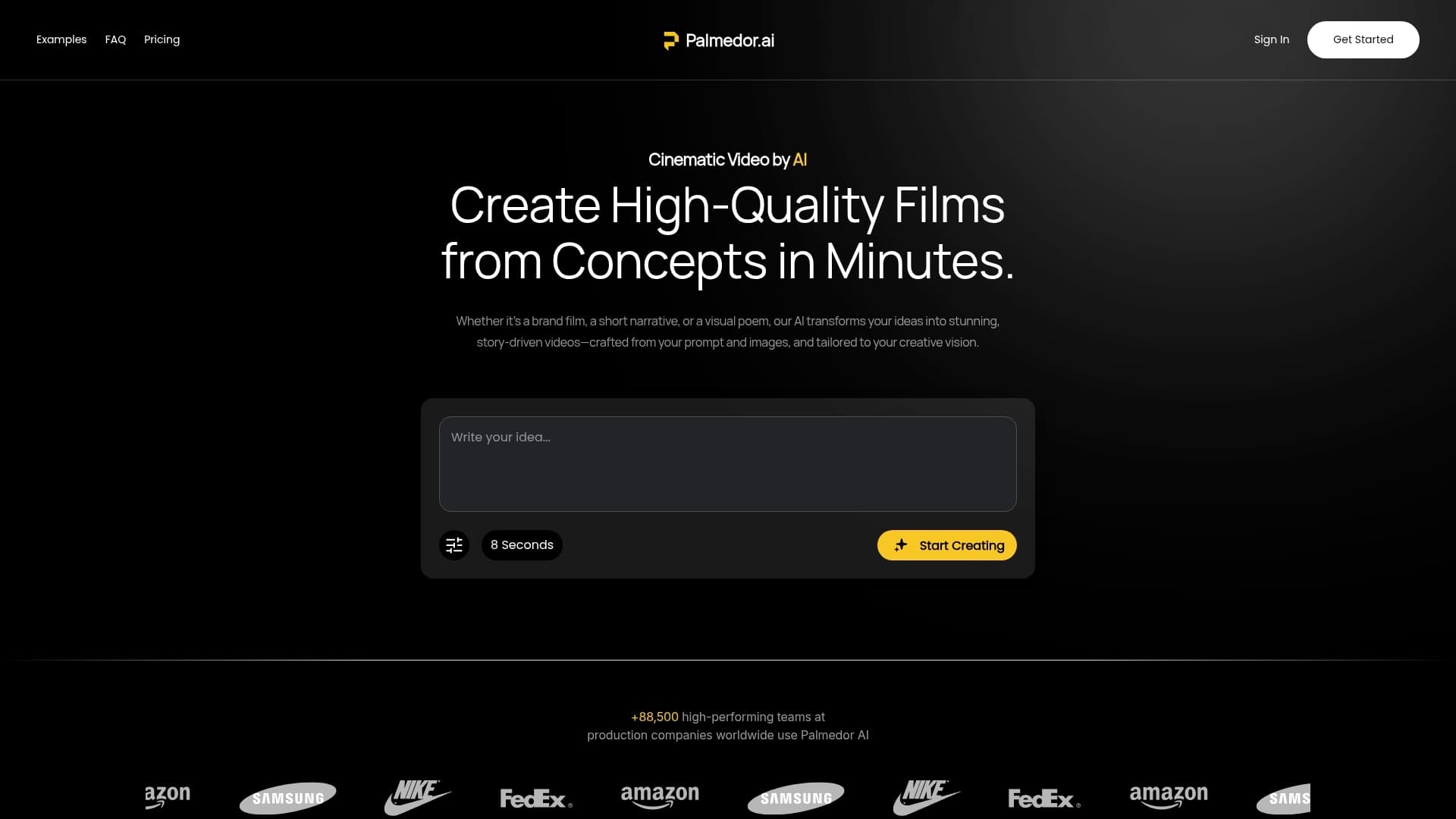AI in Video Creation: Transforming Content Production for 2025
Discover how AI in video creation is changing content production in 2025. Learn the latest tools, trends, and tips for video creators and marketers.
AI in Video Creation: Transforming Content Production for 2025

AI in video creation is turning the entire production world upside down. In 2025, creators can generate high-quality videos from simple text prompts in just seconds, something MIT’s new CausVid model has proven to be possible and lightning fast. Most would assume this technology is making human creativity obsolete, but what’s actually happening is AI is putting powerful tools in everyone’s hands and making professional-level video storytelling more accessible than ever.
Table of Contents
- The Rise Of AI In Video Creation
- Top AI Tools For Modern Video Production
- Benefits Of AI For Content Creators And Teams
- Future Trends In AI-Powered Video Creation
Quick Summary
| Takeaway | Explanation |
|---|---|
| AI is revolutionizing video production workflows | AI tools enable creators to automate tasks such as script drafting, scene composition, and video generation, significantly reducing production timelines. |
| Democratization of content creation | AI technologies lower barriers to entry, allowing independent creators and small businesses to produce high-quality videos without extensive technical skills or large budgets. |
| Need for ethical frameworks | As AI in video production grows, addressing concerns about misinformation and authenticity is crucial, requiring responsible development and deployment of these technologies. |
| Enhanced creative possibilities | AI empowers creators to explore innovative storytelling and production techniques, unlocking new narrative formats and character developments previously seen as unattainable. |
| Future trends point to greater collaboration | Emerging AI technologies suggest a future where AI acts as a collaborator, handling repetitive tasks and allowing creators to focus on artistic expression and nuanced creativity. |

The Rise of AI in Video Creation
The video production landscape is experiencing a radical transformation driven by artificial intelligence. AI in video creation is no longer a futuristic concept but a present-day reality reshaping how content is conceptualized, produced, and distributed.
Revolutionizing Creative Workflows
Artificial intelligence is fundamentally reimagining video production processes. According to MIT's Computer Science and Artificial Intelligence Laboratory, emerging AI technologies like CausVid are enabling creators to generate high-quality videos from simple text prompts with unprecedented speed and precision. This technological leap means creators can now transform abstract concepts into visual narratives within minutes, dramatically reducing production timelines.
Traditional video production involved complex, time-consuming steps involving scripting, casting, shooting, and editing. AI disrupts this linear workflow by introducing intelligent automation at every stage. Machine learning algorithms can now draft scripts, suggest scene compositions, recommend optimal camera angles, and even generate entire video sequences based on minimal input.
Democratizing Video Production
Perhaps the most significant impact of AI in video creation is its ability to democratize content production. Research from Stanford's Learning, Design, and Technology department highlights how AI technologies are breaking down traditional barriers to entry in video production. Independent creators, small businesses, and educational institutions can now produce professional-grade content without extensive technical expertise or massive financial investments.
AI-powered tools are enabling individuals with creative ideas but limited technical skills to bring their visions to life. From generating realistic voiceovers to automating complex editing tasks, these technologies are leveling the playing field. A social media manager, a small business owner, or an independent filmmaker can now create compelling visual content that previously required entire production teams.

Ethical Considerations and Future Potential
While the technological capabilities are exciting, the rise of AI in video creation also introduces critical ethical considerations. Researchers are actively exploring the potential risks associated with AI-generated content, including concerns about misinformation, authenticity, and intellectual property. The technology must be developed and deployed responsibly, with robust frameworks to ensure transparency and prevent misuse.
The future of video creation lies not in AI replacing human creativity but in collaborative intelligence. AI serves as a powerful tool that augments human imagination, providing creators with unprecedented capabilities to experiment, iterate, and realize their most ambitious creative visions. As these technologies continue to evolve, we can expect even more sophisticated, intuitive, and accessible video production solutions that will redefine storytelling in the digital age.
Top AI Tools for Modern Video Production
The landscape of video production is rapidly evolving with AI technologies that are transforming how creators develop, edit, and distribute visual content. Modern video production now leverages sophisticated AI tools that dramatically reduce production complexity and enhance creative possibilities.
Intelligent Video Generation and Editing
Research from Stanford's Learning Technologies reveals groundbreaking developments in AI-powered video editing systems. These advanced tools are not just automating tasks but actively collaborating with creators. The LAVE system demonstrates how large language models can generate intelligent video descriptions, plan editing sequences, and assist creators in achieving their artistic vision.
AI tools now offer capabilities that were unimaginable just a few years ago. Creators can input text prompts and generate entire video sequences, complete with scene transitions, camera angles, and narrative flow. Machine learning algorithms analyze vast datasets of visual content to suggest optimal editing techniques, color grading, and stylistic approaches that align with the creator's intent.
Specialized Production Workflows
Comprehensive AI cinematography research highlights four critical production categories where AI tools are making significant impacts: general production, virtual production, live production, and aerial production. Each category now has specialized AI tools designed to streamline specific creative challenges.
In virtual production, AI technologies are revolutionizing how scenes are conceptualized and rendered. Tools can now automatically generate 3D models, calibrate camera positions, and create immersive environments that seamlessly blend real and digital elements. For live productions, AI assists in real-time scene analysis, automated camera switching, and dynamic content adaptation.
Below is a table summarizing the specialized AI tools and their applications in various production workflows:
| Production Category | Specialized AI Applications |
|---|---|
| General Production | Automating scripting, editing, and content assembly |
| Virtual Production | 3D model generation, camera calibration, immersive environment creation |
| Live Production | Real-time scene analysis, automated camera switching, dynamic adaptation |
| Aerial Production | Automated drone footage capture, real-time analysis, environment mapping |
Persuasive Content Generation
Beyond technical capabilities, AI tools are becoming sophisticated in understanding and generating persuasive visual narratives. Advanced research in AI-powered video generation reveals intricate techniques for creating compelling promotional content. These tools break down video creation into three critical stages: visual material understanding, storyline generation, and post-production enhancement.
AI systems can now extract relevant visual information, arrange sequences for maximum emotional impact, and even generate background music that complements the narrative tone. This means creators can produce high-quality, engaging content that resonates with target audiences more effectively than ever before.
The emergence of these AI tools represents more than a technological upgrade. They signify a fundamental shift in creative production, where artificial intelligence becomes a collaborative partner. Creators are no longer constrained by technical limitations but empowered to explore more ambitious and innovative storytelling approaches. As these technologies continue to advance, we can expect even more intuitive, responsive, and powerful AI tools that will redefine the boundaries of visual content creation.
Benefits of AI for Content Creators and Teams
Artificial intelligence is revolutionizing content creation by providing unprecedented support and capabilities for creative professionals. Far from replacing human creativity, AI serves as a powerful collaborative tool that enhances productivity, creativity, and efficiency across various stages of content production.
Enhanced Productivity and Workflow Optimization
Research exploring generative AI tools in social media video creation reveals remarkable insights into how AI transforms content production workflows. These tools are not just technological novelties but practical solutions that streamline complex creative processes. YouTubers and content creators now leverage AI for multiple critical tasks including topic identification, script generation, visual material creation, and even content editing.
To provide a concise overview, the following table summarizes key ways AI enhances productivity for content creators:
| Workflow Stage | AI Enhancement |
|---|---|
| Topic Identification | Analyzes trends to suggest content ideas |
| Script Generation | Automates drafting of scripts |
| Visual Material Creation | Generates custom visuals from prompts |
| Content Editing | Suggests edits and automates post-production |
| Content Iteration | Rapid testing and refining of videos |
AI significantly reduces time-consuming administrative tasks, allowing creators to focus on strategic and creative aspects of their work. Automated script generation, intelligent editing suggestions, and rapid content iteration mean teams can produce higher quality content in significantly shorter timeframes. Machine learning algorithms can analyze trending topics, suggest engaging content ideas, and even predict audience preferences with remarkable accuracy.
Learning and Educational Content Creation
Innovative research in educational content generation demonstrates AI's potential to democratize learning resources. In a comprehensive study examining synthetic video creation for online education, researchers found that AI-generated educational content can be just as effective as traditionally produced materials. The study revealed no significant difference in learning outcomes between traditional and AI-generated instructional videos, suggesting these technologies can make high-quality educational content more accessible globally.
For educational content creators, AI tools offer unprecedented capabilities. They can generate comprehensive outlines, create multilingual translations, develop interactive learning modules, and personalize content based on learner profiles. This means educators and training professionals can develop more engaging, adaptive, and inclusive learning experiences with reduced production complexity.
Expanding Creative Possibilities
Advanced research in media production highlights AI's transformative potential in expanding creative boundaries. Virtual influencers, synthetic video characters, and AI-assisted storytelling are no longer futuristic concepts but present-day realities. These technologies enable creators to experiment with narrative formats, character development, and visual storytelling in ways previously unimaginable.
AI empowers creators by removing technical barriers. Complex visual effects, sophisticated animation, and high-quality production that once required extensive teams and massive budgets can now be achieved with intelligent software. Independent creators, small teams, and enterprises can access professional-grade production tools that level the creative playing field.
The true power of AI in content creation lies not in replacement but in augmentation. These technologies amplify human creativity, providing intelligent assistance that transforms how stories are conceived, developed, and shared. As AI continues to evolve, we can expect even more intuitive, responsive, and powerful tools that will redefine the boundaries of creative expression across multiple industries and platforms.
Future Trends in AI-Powered Video Creation
The landscape of video creation is on the cusp of a revolutionary transformation, driven by rapid advancements in artificial intelligence. As technology continues to evolve, we are witnessing unprecedented developments that promise to redefine how visual content is conceptualized, produced, and distributed.
Emerging Technological Paradigms
Research from the 2025 NAB Show reveals three groundbreaking trends that are set to reshape media and entertainment. The first is 'Tiered Generative AI Adoption,' which focuses on automating production tasks while simultaneously enhancing creative capabilities. This approach suggests a future where AI becomes an intelligent collaborator, handling repetitive processes and freeing creators to focus on more nuanced artistic expression.
The concept of 'Agentic AI' represents another significant leap forward. These advanced systems will be capable of autonomously managing complex tasks such as post-production indexing and content localization. Imagine AI agents that can independently handle intricate editing processes, make contextual decisions, and optimize content for different platforms and audiences without constant human intervention.
Global Content Transformation
Comprehensive research exploring AI's impact on creative industries highlights the democratizing potential of generative AI technologies. Large language models and advanced AI systems are breaking down traditional barriers in content creation, enabling creators from diverse backgrounds to access sophisticated production tools.
One of the most exciting developments is 'Real-time Monetization' technologies. AI-powered systems can now perform live dubbing and instant content localization, dramatically expanding global content reach. This means creators can potentially translate and adapt their content for international audiences in real-time, opening up unprecedented revenue streams and global market opportunities.
Technological Breakthroughs and Challenges
MIT's innovative research introduces groundbreaking models like CausVid, which can generate high-quality videos from simple text prompts in mere seconds. Such technologies represent a quantum leap in interactive content creation, allowing creators to transform abstract concepts into visual narratives with unprecedented speed and precision.
However, these advancements are not without challenges. The increasing complexity of AI systems demands robust ethical frameworks and human oversight. Researchers emphasize the importance of mitigating potential inaccuracies and ensuring responsible AI deployment. The goal is not to replace human creativity but to augment and amplify it.
As we look toward the future, AI-powered video creation promises a landscape of unbounded creativity. Creators will have access to tools that can understand context, generate intelligent suggestions, and collaborate in ways we are only beginning to imagine. The boundaries between human imagination and technological capability are becoming increasingly blurred, heralding an era of unprecedented creative expression and innovation in visual storytelling.
Frequently Asked Questions
What are the benefits of AI in video creation?
AI in video creation enhances productivity by automating tasks such as script drafting, editing, and scene composition. It democratizes content production, allowing independent creators to produce high-quality videos without extensive technical skills.
How does AI democratize video production?
AI technologies lower barriers to entry in video production, enabling individuals and small businesses to create professional-grade content easily. This means anyone with a creative idea can bring it to life without needing large budgets or specialized expertise.
What ethical considerations are involved in AI video creation?
The rise of AI in video production raises concerns about misinformation, authenticity, and intellectual property. It’s crucial to develop ethical frameworks to ensure responsible use of these technologies and prevent misuse.
What trends are emerging in AI-powered video creation for the future?
Emerging trends include tiered generative AI, which automates production tasks and enhances creativity, as well as real-time monetization technologies that allow for live dubbing and content localization, expanding global reach.
Turn AI Potential Into Powerful Video Stories With Palmedor.ai
Are you inspired by the promise of AI-driven video creation but frustrated by technical hurdles in your current workflow? The article highlights how 2025 will make high-quality content generation accessible to everyone without draining time or budget. Yet, many creators are still stuck wrestling with complicated software and slow processes, unable to fully harness innovations like smart script drafting and scene automation in their day-to-day work.

Now is the moment to bridge the gap between emerging possibilities and practical results. With Palmedor.ai, you can instantly bring your ideas to life using just a prompt or a reference image. Enjoy tools for script writing, dynamic scene management, and effortless output customization. Whether you want to create stunning brand films or quick social clips, you will find everything you need in one place. Experience AI as your creative partner and produce professional-grade videos in minutes, not weeks. Visit the platform overview or explore real-world use cases in our blogs. Sign up now and start transforming your creative vision into video reality today.